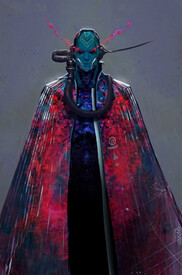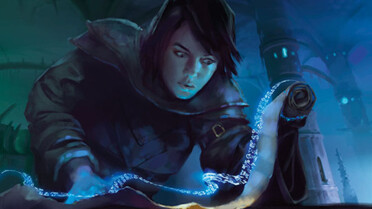James V. West’s version of the Pool has undergone many changes during its development, influenced by many different people whose contributions and suggestions were implemented, sometimes pushing the game in wildly different directions year by year, most of which are in my opinion missing the application of the game as an instrument, including the many variants. The final 2006 edition hosted on JVW’s site has a couple of rules I disagree with, and wording that can be improved.
I’m compiling a project called The Poolpendium, which will be a more extensive foray into The Pool and its many uses. But in the meantime, I’d like to give a version of The Pool which is inspired by the use Ron Edwards makes of the game as a didactic instrument on Adept Play and in the course Playing with The Pool—which I recommend.
The main differences from JVW’s version are the absence of Pool reset between sessions, and no special rules for death rolls—especially, the one where other players can gift dice.
I know the rules are underspecified, but remember: the pedagogical utility of this game is to highlight how you naturally implement what is not specified by the rules. It is not the goal of this text to provide the most complete and example-rich version of The Pool—that will be Poolpendium.
Above all, this game is an instrument and it’s not gonna play itself. The Pool is quite accessible if you’re inexperienced, but you will probably not read these rules and immediately be a proficient player. You will have to engage playfully with the system to discover how it reacts and how to make it work the best for you, and you may settle on play practices that may differ from mine – that’s fine, and that’ll be your version of the Pool.
Why Play This Game
It’s probably best that I at least make an argument for playing this game, to explain why I value it. It starts with three characteristics.
- The rules are simple and only contain what’s truly necessary to play, but they’re also surprisingly nuanced in application. You’ll learn the basics quickly and develop your understanding of the dynamics over time.
- What is there is very effective at what it does. In particular, the gambling dice mechanic is excellent at producing results that are truly chaotic, such that no-one at the table is able to guide the game into a desired outcome.
- It’s plain old fun. The amount of fun I have with this game has become my benchmark for all other role-playing games – every time I play a different game, I ask myself “am I having the same amount of fun as The Pool, and if so with how much extra effort?”. There’s fewer and fewer games that pass this test.
The consequence of all three is that this game is exceptional for practicing what I call core role-playing skills, or rather our understanding of the role-playing medium – just like sound for music, role-playing is made of a certain stuff, if you allow the term. This game is so naked while remaining functional that whatever else there is, you have to have brought it to the table, and you can easily observe how you can do things differently to make it work better. You get better at making it run. And you take these skills back to other role-playing games.
Apart from this, I make no claim to innovation. Certain mechanics, like Monologues of Victory, may look weird to you if you’re used to playing differently, but overall these are things that you can already find in plenty of role-playing groups not involved with The Pool.
Froggy’s The Pool—A Learner’s Version
This work is distributed under a Creative Commons Attribution 4.0 International License.
The Pool is a simple role-playing game originally written by James V. West. This version is made by Claudio “Froggy” and contains modifications inspired by usage by Ron Edwards in his course “Playing with The Pool” and his essay “Understanding The Pool”.
To play The Pool you will need many six-sided dice (d6). The more the better. Some of the dice should look different from the others: you don’t need that many of these.
One of the players is called the Game Master (GM), and they have a supporting role in the game, different from that of the other players. Typically the person who proposes the game to the others will tend to be the GM, but this doesn’t have to happen.
Start Document
Before you start playing The Pool and making up your characters you will need something to get everyone on the same page regarding colour and setting, and to serve as inspiration for making up characters. Let’s call this the start document. If you are planning to play as the GM, you’ll probably be the one to put it together and propose it to the others, but this is not strictly necessary.
The start document should provide a touch of colour to inspire making up characters, and little else. Usually it will be a paragraph of text with an associated image board (search engines are your friends), but you can also include things like a song or music video, or other inspirational material.
At this point you have not yet prepared any situation. This start document is all you’re going to have before character creation.
This is also the time to determine, if you wish, any constraints on character creation, for example, “All characters will be members of the U.S. Navy.” You can further narrow it down by writing more information in the beginning document; this can be useful for one-shots. For an example of the latter, see my one-shot “The Siege of Enrilise”, which has a more elaborate start document.
Example: Start Document for Fyodor 11
At the edges of the known galaxy, where the long arm of the UMWF (United Milky Way Federation) barely reaches, over unexplored ruins of forgotten civilizations, lives a variety of outlaws, mystics, heretics, political dissidents, and native species. The planet of Fyodor 11, for its proximity to the centrewards interstellar routes, is the beating heart of this frontier.
Make Up Your Character
If you are not playing as the GM, your job is to make up a character you like and play them as a real person, as earnestly as you can. You don’t need to be friends or allies with the other characters, or work in a team, and you can even make up a villainous character if you like. You don’t need to make up your character in collaboration with the other players.
Use one of the images in the start document as inspiration, as a representation of the character or someone similar or related. Alternatively, provide an image of your own on the same theme and use that.
Character Story: Write 50 words or less to describe at your leisure their appearance, status, origin or heritage, what they are capable of doing, their equipment, resources, relationships, companions, or what they desire.
- Use first or third person at will.
- Don’t use purple prose, superlatives, or generalized terms.
- Invent and include other characters or past events if you like.
- Give the character a name. This doesn’t count toward the 50-word word count.
- You may freely repeat the character’s name—it doesn’t count towards the 50 words either.
- Keep track of the number of words you didn’t use.
Traits: After writing the story, highlight whatever words or phrases seem important to you and give them a bonus of +0. These will be your Traits. A Trait can be anything: a skill, a desire, a relationship, a flaw, a belief. Traits can also have negative descriptions, but they always have a null or positive bonus.
Bonuses: You have 15 starting dice. You can spend up to 14 of them on Trait bonuses by paying the square of the desired bonus: +1 costs 1 die; +2 costs 4 dice; +3 costs 9 dice.
Pool: The remaining dice become your starting Pool.
You can also buy traits at any time during play, even right before a roll, or improve them by paying the difference in cost—for example, improving from +1 to +2 costs 3 dice—from your Pool.
The GM’s Preparation
If you are playing as the GM, you will receive the characters’ stories and will have to make up a situation that can involve all of them. The contents of the start document and the characters’ stories act as constraints, but you can feel free to interpret the characters’ stories as told from a limited perspective, rather than objective fact.
Any secondary characters mentioned in the characters’ stories become your GM characters, and you can make up others as you wish. GM characters are the primary elements of your situation, and it is good to have their personalities and goals in mind before bringing them into play.
This version of The Pool explicitly gives little instruction about how to prepare, and what notes to take—experiment and learn what works best for you. Your goal would be to jot down things that will allow you to respond readily as the situation develops, while treating the GM characters as if they’re real people, rather than cardboard cut-outs.
Rules of Play
The GM interprets the backstories and physical characteristics of situations in play. Other players’ input on their characters’ backstories and knowledge is restricted to the content of their characters’ stories. Unless a player intercedes by declaring an action, the GM introduces new situations, including cuts and framings in space and time. The GM plays all of the GM characters, including those listed in the characters’ stories.
Conflicts (die rolls) can be identified by anyone based on what is happening or what is about to happen. Except for the GM, all players whose characters are involved in the conflict must roll.
The scope of a roll and whether it has potential harmful or lethal effects are identified by the GM before rolling. Each person states and clarifies the intent and goals of the characters he or she controls and what they want to gain from the conflict. It is a good idea to clarify the situation until you have as different and orthogonal goals as possible for each player rolling—rarely people do the same things for the same reasons.
The roll is carried out as follows.
- The GM hands out 1 to 3 gift dice to each person, following whatever metric they like.
- Each player may invoke a Trait, bringing it into play and explaining how it relates to the current conflict (even negatively). He adds a number of dice equal to the trait’s bonus.
- Each player may wager any number of dice from his Pool.
Everyone rolls dice at once. If at least one die shows a “1” the conflict is a success for that player.
- If the conflict fails, the GM narrates the result and all wagered Pool dice are lost.
- If the conflict succeeds, the wagered dice go back into the player’s Pool and they choose whether:
- the GM does minimal narration and the player adds a die to their Pool, or
- the player narrates (does a Monologue of Victory) with greater latitude to determine effects and consequences.
Whoever narrates must describe the success or failure of each of the characters involved, including the order and causality of events, actions, effects, and characterizations of the characters.
Whoever narrates must keep in mind that the effects of the roll must be as conclusive as possible within the scope and purpose of the conflict, meaning that a clear change in the situation must occur. As long as this doesn’t happen the narration doesn’t end.
Non-GM players should keep in mind that they cannot add new information or make up new elements of the backstory; they can only use elements that have already been established, or ask the GM as part of their narration to provide the necessary details. The GM speaking does not end outcome narration, as they’re simply helping the narrating player.
When narrating, The GM should keep it as basic and minimal as possible, while others can afford to be more extravagant in their descriptions.
Two monologues: In case two players want to do a Monologue of Victory, they will have to collaborate narrating and share the monologue.
Death: There are no special rules for death. It is up to the GM to determine before rolling whether a roll can cause a character to die. Except in obviously deadly situations, it is normal to declarea roll as lethal only after a previous damaging roll has been missed.
Development
During the game or between sessions, assign or increase Trait bonuses using your Pool dice using the method explained during character creation.
Between sessions, you get 15 words to add to your character’s story, either as new sentences or as revisions of what you have already written—1 word can count as an addition, deletion, or substitution. Slight revisions of grammar don’t count toward word expenditure. Words may be spent immediately or left for the next session. Underline any new Trait.
Optional Rule 1: Instead of 15 words per session, get 5 words for each hour played in your last session.
Optional Rule 2: Between sessions, add 1 die to your Pool for each hour played in the your last lession.
Optional Rule 3: If deleting words completely erases a Trait, add a number of dice to your Pool equal to that Trait’s bonus. Warning: it is generally better to rewrite Traits in the past tense than to delete them. Use this option with caution.





